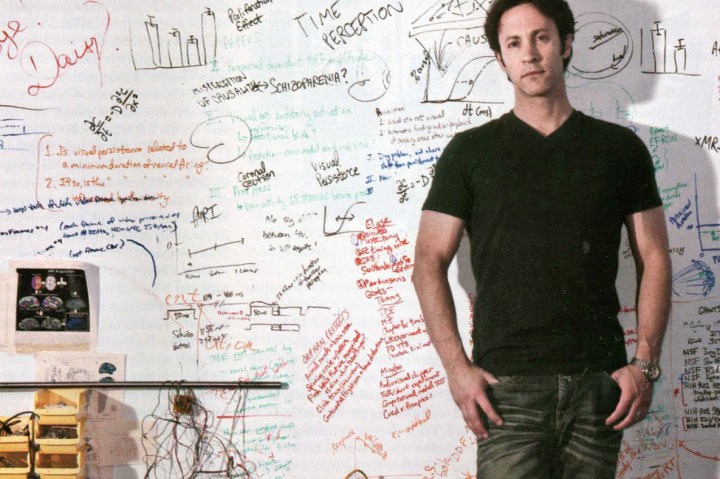Sci-Tech
Neuroscientist David Eagleman’s judicial case for the brain

“Super scientist” David Eagleman says that legal and judicial systems are, for the most part, operating in ignorance about what is known about neurobiology. Because not all criminals’ brains are equal, he’s working toward an overhaul of how criminals should be treated by society. By MANDY DE WAAL.
On 22 July 2011, after bombing government offices in downtown Oslo, Norwegian right-wing extremist Anders Behring Breivik made his way to Utøya island, a small partly forested island where the youth wing of that country’s Labour Party was holding its annual summer camp.
Disguised as a police official, Breivik summonsed people towards him pretending to be someone who could be trusted. As a crowd drew nearer, the man who has admitted to killing 69 people on that island and another eight using a fertiliser bomb, pulled out his weapons and started shooting indiscriminately. In the mayhem that ensued, Breivik stalked and executed youngsters for an hour and a half, often shooting his victims in the back as they tried to flee for their lives.
Breivik appeared in a public court for a hearing and faced the relatives of his victims for the first time on Monday 14 November 2011, when he called himself a “resistance” fighter. He acknowledged what he had done, but said: “I don’t deny my actions, but I don’t accept having been imprisoned for them.”
A new courtroom is being constructed for Breivik’s trial which begins mid-April 2012 and though Norway has one of the most lenient judicial systems in the world, it is a far cry from the scientifically infused system neuroscientist Dr David Eagleman argues for in his book “Incognito: The Secret Lives of the Brain”.
In short, Eagleman’s key hypothesis in Incognito is that people aren’t as in control as much as we’d all like to think. Writing for The Atlantic, Eagleman explains: “We are not the ones steering the boat of our behaviour, at least not nearly as much as we believe. Who we are runs well below the surface of our conscious access, and the details reach back in time to before our birth, when the meeting of a sperm and an egg granted us certain attributes and not others. Who we can be starts with our molecular blueprints—a series of alien codes written in invisibly small strings of acids—well before we have anything to do with it. Each of us is, in part, a product of our inaccessible, microscopic history.”
The polymath who’s become something of a science celebrity, Eagleman says that if one carries a particular set of genes, the likelihood of your committing violent crime is four times higher than if you lacked those genes. “The overwhelming majority of prisoners carry these genes; 98.1 percent of death-row inmates do. These statistics alone indicate that we cannot presume that everyone is coming to the table equally equipped in terms of drives and behaviours,” he writes.
Eagleman’s working with other neurobiologists, medical humanists, legal academics, experts in ethics and policy makers to oversee research with the aim of creating evidence-based criminal policy. Basically Eagleman wants the judicial system to be overhauled so that it acknowledges what science knows about the 1.4 kilogram jellied mass inside our skulls. That free will isn’t that free, and that we are not quite the masters of our destiny we thought ourselves to be.
Watch David Eagleman speaking about the law and the brain:
“We come to the table with a certain set of genes and these intertwine in a very complex way with our all of our experiences, starting from in the womb and that sets every brain off on its own developmental trajectory, and as a result brains are very different,” says Eagleman, speaking to Daily Maverick from the Laboratory for Perception and Action at the Baylor College of Medicine in Houston, Texas which he heads.
In this lab Eagleman studies how the brain constructs perception and why different brains do this differently. The man who’s called “the Malcolm Gladwell of science” focuses on three areas: time perception; synaesthesia, where information between senses is blended; and neurolaw, where Eagleman’s doing the work of pioneering how neuroscience discoveries should guide policy making for criminal law making, punishment and rehabilitation.
“Each brain is very different from every other; there is as much variability on the inside as there is with there is say with body types on the outside. So what this means is that it is not that we don’t have choices and can’t make decisions to try to navigate our lives a certain way, but we are limited by the kind of brain that we have,” Eagleman says adding: “I believe we do have some amount of decision-making and free choice that we have as humans, but it is not the degree of freedom that people often think. In other words, free will isn’t totally free, it depends on what you are coming to the table with biologically.”
So what’s the difference between Breivik’s brain and Eagleman’s? The New York Time’s best-selling author speaks rapid fire over the phone from Houston, but is incredibly deliberate, clear and nuanced. Before tackling how his 1.4 kilogram mass of complexity differs from that of a mass murderer’s, Eagleman prefaces his explanation by saying: “Let me add one piece of subtlety to that statement.”
Speaking to Eagleman, it is clear why he’s become the celebrated poster boy of neuroscience. He masterfully takes the complex and makes it easily understood, much to the chagrin of his critics. “We are actually more than our brains. It involves the whole body but it is mostly the brain and the reason we know that is because if you damage some aspect of your body, you are not that different, but if you damage even a small part of your brain, you can change a lot.”
“The brain is the densest concentration of us, but I do mean to say that the rest of the body is involved too. Not only that, but the social fabric you are embedded in can influence people’s social behaviour, so part of you differs just by the social fabric,” says Eagleman, who adds that if a psychopath in a suit was to get a position in Wall Street he could do quite well.
“He doesn’t care about other people, and their emotions. He crushes his opponents and he might become a very successful Wall Street magnet. But if you put him in a different sort of scenario, a bad neighbourhood with different sorts of opportunities, then he might end up committing crimes and being in jail. So context matters also. But with all of those caveats, which are important, it is of course the case that the main difference between psychopaths a normal brain is all in the neurobiology.”
Eagleman says that when a person with a brain like Breivik’s stands in front of a judge, there’s a complex intertwining of genes and experience. “Yes, you can have unlucky genes and unlucky experiences and you can end up on a brain trajectory that is just a bad toss of the dice, and of course that happens all the time. When somebody ends up on the wrong side of the legal system we can’t necessarily look at them and say well I wouldn’t have done that and so we’re going to make this guy hurt. We are really going to punish this guy.”
Because people’s brains are different on the inside, Eagleman says the law shouldn’t take a one-size-fits-all blameworthy approach. “I need to emphasise that this does not mean we let people off the hook and it does not mean that a biological explanation leads to exculpation. What it means is more rational sentencing and more customised rehabilitation. It means that we don’t have to treat incarceration as a one size fits all solution, but instead, we can understand in a more refined manner how people have ended up the way they have, and what we need to do.”
We will end this story with Eagleman’s appeal for a more refined understanding of human behaviour where the law and the judicial system doesn’t pretend that all brains are equal, and that everyone is coming to the table to use their free will to make good decisions because his research shows that this isn’t the case.
Watch David Eagleman speaking about his book Incognito:
“The legal system rests on the assumption that we are ‘practical reasoners’, a term of art that presumes, at bottom, the existence of free will. The idea is that we use conscious deliberation when deciding how to act – that is, in the absence of external duress, we make free decisions,” Eagleman writes for The Atlantic, arguing that high-level behaviours can take place in the absence of free will, and that it is possible that murder can be committed on the same kind of autopilot as breathing or blinking.
“While our current style of punishment rests on a bedrock of personal volition and blame, our modern understanding of the brain suggests a different approach. Blameworthiness should be removed from the legal argot. It is a backward-looking concept that demands the impossible task of untangling the hopelessly complex web of genetics and environment that constructs the trajectory of a human life,” Eagleman writes.
“Instead of debating culpability, we should focus on what to do, moving forward, with an accused lawbreaker. I suggest that the legal system has to become forward-looking, primarily because it can no longer hope to do otherwise. As science complicates the question of culpability, our legal and social policy will need to shift toward a different set of questions: How is a person likely to behave in the future? Are criminal actions likely to be repeated? Can this person be helped toward pro-social behaviour? How can incentives be realistically structured to deter crime?” DM
Read more:
- The Brain on Trial by David Eagleman in The Atlantic;
- Your Brain Knows a Lot More Than You Realize by David Eagleman in Discover Magazine;
- The Possibilian – What a brush with death taught David Eagleman about the mysteries of time and the brain in The New Yorker.
Photo: David Eagleman by Dan Winters






 Become an Insider
Become an Insider